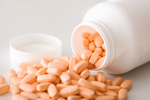 Wrapping up the short series on niacin, an important B-vitamin, here are the fine point details of dosage, supplements, and possible side effects.
Wrapping up the short series on niacin, an important B-vitamin, here are the fine point details of dosage, supplements, and possible side effects.
First, the dosage. The dose that increases HDL cholesterol and decreases triglycerides (both positive in protecting yourself from heart disease) the most is between 1,200 and 1,500 milligrams (mg) a day. But niacin’s biggest impact on LDL levels is at 2,000 to 3,000 mg a day. To prevent heart attacks, work with your doctor, as the daily dose will be around 4,000 mg.
Find supplements as either “nicotinamide” or “nicotinic acid.” The former is found in nutritional supplements and fortified foods. It may be difficult to choose the type of supplement for nicotinic acid. The three types of preparations that claim to contain 500 mg of niacin are:
1. Immediate-release niacin which, when ingested, is absorbed into your bloodstream within one hour;
2. Sustained-release niacin, which is absorbed over several hours after ingestion; and
3. No-flush niacin.
Here’s what I can tell you: the no-flush is most expensive, and contains about 50 mg of niacin. Go for the immediate-release pills, because they are cheapest and contain around 500 mg per tablet.
Side effects are related to dose. At 30 mg a day, you might have itching, redness, and burning or tingling sensations. The higher the dose, the more likely you’ll get these. To reduce your risk, take niacin with meals, and use the #2 product at bedtime. Side effects of niacinamide are different and can include nausea, vomiting, headache, dizziness, diarrhea, elevated blood sugar, liver toxicity, and blurred vision. If you are taking medications for diabetes or statins, talk to your doctor. If you wear a nicotine patch, you have a higher risk of dizziness and flushing.
When you take any drugs or supplements, it’s always important to know the full picture. Understanding doses and adverse effects is vital.
Read my previous articles in this series:
